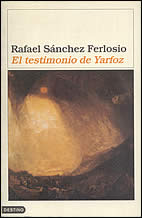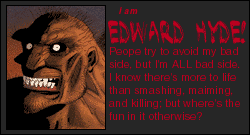Apocalípticos e integrados ante Harry Potter
En Harry Potter and The Meaning of Life Jennie Bristow examina el éxito de los libros de Harry Potter entre los adultos. En el caso de los niños, aparentemente, no hay mucho que explicar, porque a los niños les gustan las golosinas sin sustancia. ¿Pero los adultos? Pues estos, parece ser, leen los libros de Harry Potter porque en el fondo son unos infantiles:
Today’s young adults do not want to leave the parental home, they watch nostalgia programmes on ‘I love the 1990s’ when the decade has barely ended, they use websites like Friends Reunited to get back in touch with schoolfriends when they have barely left school themselves, and they go to ‘School Disco’ nights at London clubs, dressed in a version of school uniform and dancing to music from their recent past.
What should be more natural for a generation that does not want to grow up than to cocoon itself in children’s books? Books that are, as Joel Rickett says, easy to read, comforting, and nostalgic for a recently-lost youth.
Lo interesante del asunto es que no me identifico en absoluto con esa imagen. Me estoy acercando ya a la mediana edad, hace años que no vivo en casa de mis padres, leo de todo y encima lo último que querría sería volver a la infancia. ¿Es tan difícil creer que la gente a veces hace cosas porque le gustan? ¿De verdad «porque me gusta» es una respuesta tan insatisfactoria?
Le comenté a Xavier Riesco el asunto y éste me ofreció una perspectiva algo diferente. Claro que estamos alejándonos del mundo adulto, me dijo, pero no de cualquier mundo adulto, sino de una cierta concepción del mundo adulto en el que tienes obligaciones, responsabilidades y casi ningún derecho, cuya única función vital parece ser la de consumir y convertirte en engranaje del sistema. ¿Quién no querría escapar de eso y recuperar algunos -los pocos- aspectos positivos de la infancia? Quizá no le falte razón.
En lo demás, dejemos de lado la discusión de calidad literaria, siempre subjetiva, entre otras cosas porque yo creo que en la novela, la literatura actúa a nivel de párrafo no al nivel de palabras, porque entonces sería poesía -y sí, hay novelas muy poéticas, que no deja de ser una forma de escribirlas- y centrémonos en otra de las acusaciones:
It’s not that Harry Potter is a form of inappropriate social commentary – it is not social commentary at all. These books catapult the reader into a safe moral universe of Good v Evil, uncomplicated by the moral dilemmas of the real world. And it is this that, ultimately, renders them quite banal.
y observemos al personaje de Severus Snape. Fue malvado en el pasado, es tremendamente desagradable, Harry y sus amigos no lo pueden soportar, y sin embargo, se supone que forma parte de los buenos. ¿Es realmente bueno? ¿Es malo? ¿O quizá es gris y humano? El propio Harry se equivoca continuamente, rara vez gana por sí solo y en el quinto libro está francamente insoportable (cosa que me encanta por cierto, porque le añade salsa al personaje). ¿No nos sucede eso a diario? ¿No tenemos que aprender a tratar todos los días con personas que detestamos? ¿No tuvimos en su día que aprender a callarnos porque hablar a destiempo era peor? Quizá no sean profundas lecciones vitales y morales, pero tampoco me parecen banalidades.
Se dice que la literatura habla de la condición humana y que esa es una de sus grandes características. Me parece uno de esos clichés que además resultan tener algo de verdad. Lo que solemos olvidar es que hay muchas condiciones humanas y que quizá la condición humana de una periodista que escribe sobre libros no sea la reflejada en los libros de Harry Potter. Pero quizá el éxito de los libros de Harry Potter entre los niños se deba a que ellos sí se ven reconocidos en la condición humana descrita en sus páginas, pero no de una forma simple -vamos a leer una aventura- sino identificándose con aspectos concretos y viendo la conexión con sus existencias y relaciones. Por ahí parece ir este otro artículo, The Real Magic of Harry Potter:
Rowling creates a bridge for kids to cross from her magical world to their own, built out of rules and constraints that both share. The very existence of Hogwarts School, the training academy for young wizards, is a testament to the reality that learning still takes time and patience. There’s no spell that fills one’s head with knowledge; the best Hermione can manage in Book 3 is the Time Turner, to give her more hours to study. The Weasleys, Ron’s family, are still poor—and any world in which a family as hardworking, loving and generous as theirs still struggles to put food on the table is, well, a lot like our own. Mrs. Weasley can cast a spell to make dirty dishes clean themselves, but she can’t create new kitchenware out of thin air. Rowling has created a world in which a boy can fly on a broom, talk to snakes and grow gills like a fish, but he can no more easily cope with his crushing sadness about his dead parents than any other child. «She mixes the real-life struggles in with the imaginary, magic struggles,» says Casey Brewer, 15, of Longwood, Fla. «Harry and his friends have to think through the obstacles in life the same as they have to think through an obstacle that’s a three-headed dog. It’s, like, inspirational.»
Inspirational, but mercifully not perfect. Wizards have troubles and egos and envy and ratty robes they are embarrassed to wear. Harry is capable of jealousy and insensitivity. He breaks rules and doesn’t tell grownups things it would plainly be in his interest to reveal. He gets into trouble. («If he didn’t, you wouldn’t have all those pages to read,» notes Zack Ferleger, 12, of Encino, Calif.) Hermione may be smart, but she can be rigid; Hagrid is loving, but to a fault when it comes to horribly scary beasts. Ron is loyal but insecure. Rowling loves her characters and invites readers to love them, not just despite their flaws but because of them. Since one’s flaws loom large in adolescence, that is quite a healing potion.
Yo, por mi pasado profesional como profesor de instituto, tuve que tratar con muchos adolescentes. Solemos pensar que carecen de sofisticación, y quizá sea cierto que no tienen la de un adulto (sólo quizá), pero lo que siempre me dejaron claro es que inteligencia no les falta (aunque tiendan en general a no aplicarla en clase), ni tampoco una concepción propia del mundo. Quizá los libros de Harry Potter les hablen a ellos como no nos hablan a los adultos.
[Estoy escuchando: «Pero Que Seja A Gente» de Savall, Jordi en el disco Sabio: Cantigas de Santa Maria]
 Yarfoz, hijo de Vigriscidio, un anciano hidráulico que habita en la ciudad de Escescésina, ha aprendido el oficio de su padre y se ha convertido en uno de los mejores profesionales al servicio de Nébride, el príncipe de la ciudad. Juntos se embarcarán en las tareas de desecación de las tierras pantanosas y de la canalización del río Dul. Pero las divergencias con otras ciudades adversas obligarán a Nébride a exiliarse con su familia. Yafoz le acompañará en una travesía por la tierra de los Iscobascos y el reino de Yund. En ese periplo, Yarfoz dará fe de cuanto le rodea, desde paisajes hermosísimos a extrañas necrópolis, y también observará las conductas de los hombres que encuentra a su paso, sus pasiones recurrentes y sus obcecaciones, en un juego de actitudes prácticamente circular.
Yarfoz, hijo de Vigriscidio, un anciano hidráulico que habita en la ciudad de Escescésina, ha aprendido el oficio de su padre y se ha convertido en uno de los mejores profesionales al servicio de Nébride, el príncipe de la ciudad. Juntos se embarcarán en las tareas de desecación de las tierras pantanosas y de la canalización del río Dul. Pero las divergencias con otras ciudades adversas obligarán a Nébride a exiliarse con su familia. Yafoz le acompañará en una travesía por la tierra de los Iscobascos y el reino de Yund. En ese periplo, Yarfoz dará fe de cuanto le rodea, desde paisajes hermosísimos a extrañas necrópolis, y también observará las conductas de los hombres que encuentra a su paso, sus pasiones recurrentes y sus obcecaciones, en un juego de actitudes prácticamente circular. Este libro que el lector tiene en sus manos es una pieza única por su contenido y por quien lo ha compilado: en efecto, el gran científico Stephen Hawking ha reunido en él, por primera vez en la historia de la edición, las cinco obras que a su juicio representan el canon de la cultura universal en el campo de la Física y la Astronomía y ha escrito una introducción a cada una, explicando lo que han significado para la ciencia, vinculándolas entre sí y ofreciéndonos cinco soberbios retratos de los genios que las escribieron:
Este libro que el lector tiene en sus manos es una pieza única por su contenido y por quien lo ha compilado: en efecto, el gran científico Stephen Hawking ha reunido en él, por primera vez en la historia de la edición, las cinco obras que a su juicio representan el canon de la cultura universal en el campo de la Física y la Astronomía y ha escrito una introducción a cada una, explicando lo que han significado para la ciencia, vinculándolas entre sí y ofreciéndonos cinco soberbios retratos de los genios que las escribieron: